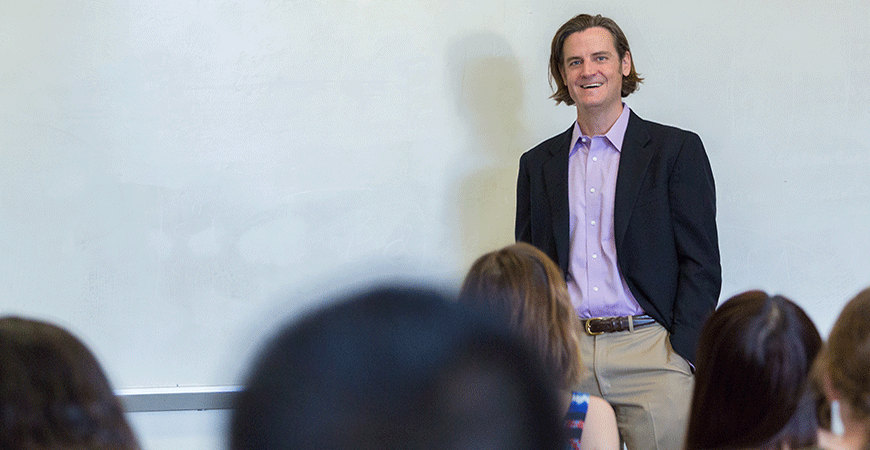
Every 10 minutes, someone is added to the national organ transplant waiting list, and about once every hour, someone on the list is removed — either because they died while waiting or grew too ill for surgery.
The number of Americans on the waiting list totals more than 114,000 as of this writing, and about 30,000 transplants will be performed this year. In part, that’s because there are not enough organ donors.
Two new collaborative papers by UC Merced Economics Professor Kurt Schnier reveal that increasing the incentives and eliminating barriers for donors — both living and deceased — would greatly improve other people’s chances of receiving life-saving transplants.
One collaboration, involving a transplant surgeon and two other economists, focused on increasing people’s willingness to be deceased organ donors. The other collaboration, involving two transplant surgeons and a public health researcher, investigated a government policy targeted at increasing living organ donation by lowering donor-related costs.
Both interdisciplinary collaborations revealed that people don’t need to be paid to be donors (which is illegal and unethical anyway) — all they really need is a reduction in the current disincentives.
“As a living donor, you don’t get a lot of the donation related costs covered,” Schnier said. “Your incidental costs of being a living donor and days off work are not covered. You don’t get additional health insurance in case you need it after surgery. You don’t get any tax breaks.” All those benefits are labeled “valuable consideration” and considered payment for organ donation — a violation of the National Organ Transplant Act (NOTA).
In “Subsidizing Altruism in Living Organ Donors,” in the journal Economic Inquiry, the researchers examined a program run by the National Living Donor Assistance Center (NLDAC). Using funds from the Department of Health and Human Services, NLDAC alleviates the travel and lodging costs for low-income live kidney donors.
That relief alone increased the number of donations by 14 percent at participating U.S. transplant centers.
“Just that little bit of help raised the rates by that much,” Schnier said. “The program costs about $2 million a year but has a net benefit to society of about $250 million a year.”
I think it would make a lot of sense to offer people additional health care coverage if they are going to donate. That way, they have the peace of mind knowing that if they need it, the insurance is there to help them.”
In the second paper, “Can We Increase Organ Donation by Reducing the Disincentives? An Experimental Analysis,” in the journal of Economics and Human Biology, Schnier and his colleagues look at post-death donations, which account for the majority of kidney transplants.
“There are many psychological costs for people in the case of deceased organ donation,” he explained. “It can be hard for people to sign the form because they struggle with the thought of their own death or potential differences between their preferences and their loved ones’. Sometimes there are religious concerns.”
The researchers used computers to create “virtual people” and developed an algorithm that assigned each virtual person a probability of having either brain or organ failure. They also assigned financial costs to the psychological factors that play into people’s decisions to donate. When costs were high or moderate, virtual donations were low — about 20 percent.
The virtual people were quite altruistic though. When the psychological cost was reduced to nothing, the number of donors shot up to more than 60 percent.
Perhaps surprisingly, when the researchers offered to “pay” the virtual people for donation, the number of donors only rose by approximately another 15 percent.
Both papers include ideas for eliminating barriers and increasing incentives for donors, but some of the ideas would mean redefining “valuable consideration.”
“I think it would make a lot of sense to offer people additional health care coverage if they are going to donate,” Schnier said. “That way, they have the peace of mind knowing that if they need it, the insurance is there to help them.”
The researchers suggest more education and careful framing of the “very delicate” discussion about post-death donation. Their research also aligns with other recommendations that have been made to increase organ donation including:
· Giving registered donors priority if they land on the transplant waiting list; and
· Making people opt out instead of making people opt in to be donors (usually done when you get or renew your driver’s license).
“Both of these will increase organ donation,” Schnier said.
Schnier is with the School of Social Sciences, Humanities and Arts, and co-leads the UC Merced branch of the Blum Center for Developing Economies. His focus on behavioral economics, human biology and health is just one example of the intersectional and interdisciplinary research that is a hallmark of UC Merced.
“As with any of the social sciences, what we’re really looking at is human behavior,” he said.



